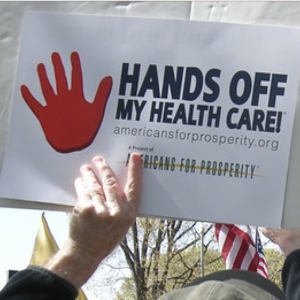America’s private health insurance system is beyond saving, we’re often told by advocates of Medicare for All. As they see it, the only path forward is to abolish private coverage and replace it with a single government-run program.
But that radical proposal is divorced from reality. New polling data show that most Americans are satisfied with their coverage. And privately insured individuals are especially happy with their health plans.
This fact ought to be central to our healthcare debate. And yet, single-payer absolutists would rather suppress this truth — and subvert the patients’ preferences — than give up their ideological commitment to socialized medicine.
In just a few years’ time, Medicare for All has moved from the fringe to the mainstream of Democratic Party politics. Sen. Bernie Sanders’ latest version of the reform, introduced in the Senate in May, has no fewer than 14 co-sponsors — all Democrats.
One might assume that this reflects widespread public dissatisfaction with private coverage. But that’s not the case. According to a new survey conducted by Echelon Insights for the organization I lead, the Pacific Research Institute, 86 percent of Americans are satisfied with their current health insurance plan. Just 8 percent are dissatisfied.
Even more telling is how satisfaction rates vary. More than seven in 10 employed Americans — who most likely have coverage through work — described their health insurance plans as good. Less than half of unemployed Americans said the same about their health plans.
It’s important to note that more than four in 10 patients in this second group are covered by Medicaid. This suggests that patients with private insurance are far more satisfied with their coverage than those with government-provided insurance.
Our findings are consistent with the results of years of similar surveys. In a Gallup poll taken in November 2020, for instance, a record 74 percent of respondents rated their health coverage as either “excellent” or “good.”
Mind you, this assessment came amid one of the worst public health crises in recent memory. Yet even the COVID-19 pandemic didn’t do much to undermine America’s opinion of their health insurance. In fact, as the Gallup report notes, these positive appraisals of health coverage “have not varied much in the 20 years that Gallup has measured them.”
So it’s reasonable to ask why Democrats’ long-term desire for Medicare for All hasn’t met much resistance among voters. Part of the reason is that the idea’s supporters have deliberately misrepresented the basic features of their plan.
Many Americans don’t realize that a single-payer overhaul would eliminate all private health insurance. When they find out, their level of support plummets. In early 2019, 56 percent of Americans said they favored Medicare for All, according to a Kaiser Family Foundation survey. But when told that it would abolish private coverage, only 37 percent approved.
When told that a single-payer system would also require tax increases for most Americans, a similar drop-off in support occurred. And when patients learned that Medicare for All would cause treatment delays — as all government-run healthcare systems invariably do — support fell to just 26 percent.
The Kaiser survey might underestimate public antipathy to single-payer. In a Hill-HarrisX poll in December 2020, just 12 percent of Americans supported a Medicare for All policy that abolished private coverage.
America’s health insurance system is not perfect. Yet it remains immensely popular among the vast majority of Americans. In any other domain, such consistently stellar approval ratings would be trumpeted as a mark of success.
But for Democrats, the inconvenient truth of a functioning, market-based health insurance sector impedes a government healthcare takeover that most Americans don’t want.
The midterm elections are just around the corner. It’s time for Republicans to present a positive proposal for healthcare reform that prioritizes consumer choice and competition.

